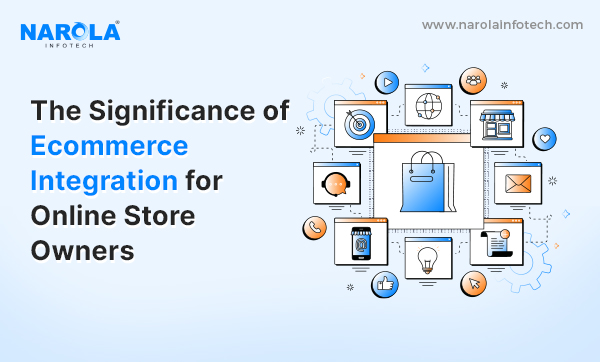In the fast-paced digital landscape, online store owners are continually seeking ways to enhance their business operations and stay ahead of the competition. One key strategy that has proven to be pivotal in achieving success is Ecommerce Integration. This blog explores the importance of Ecommerce Integration for online store owners and sheds light on how Narola Infotech can be the catalyst for seamless integration.
Streamlining Operations
Efficiency is the heartbeat of any successful online store.
Ecommerce Integration allows store owners to streamline their operations by
connecting various systems and processes. This includes inventory management,
order processing, and customer relationship management. With a unified system,
manual tasks are minimized, reducing the likelihood of errors and delays.
Enhanced Customer Experience
Customer satisfaction is paramount in the world of online
retail. Ecommerce Integration enables online store owners to provide a seamless
and enjoyable shopping experience for their customers. Integrated systems allow
for real-time updates on product availability, order status, and shipping
information. This transparency builds trust and loyalty among customers.
Multi-Channel Selling
Online store owners often operate on multiple platforms to
expand their reach. Ecommerce
Integration enables seamless multi-channel selling by synchronizing product
listings, inventory, and order processing across various platforms. This not
only broadens the customer base but also ensures consistency in product information
across different channels.
Data Accuracy and Decision-Making
Accurate and up-to-date data is crucial for making informed
business decisions. Ecommerce Integration ensures that data is synchronized
across different systems, preventing discrepancies and inaccuracies. This
accurate data serves as a foundation for strategic decision-making, allowing
online store owners to identify trends, optimize marketing strategies, and adapt
to market changes swiftly.
Cost Savings
Manual data entry and the management of disparate systems
can be time-consuming and prone to errors. Ecommerce Integration automates many
processes, reducing the need for manual intervention. This not only saves time
but also cuts down on operational costs. By eliminating inefficiencies, online
store owners can allocate resources more effectively and focus on growing their
business.
Narola Infotech: Your Ecommerce Integration Partner
Narola Infotech
stands as a reliable partner for online store owners looking to harness the
power of Ecommerce Integration. With a proven track record of delivering
cutting-edge solutions, Narola Infotech offers tailor-made integration services
that align with the unique needs of each business.
Whether it's integrating with popular
Ecommerce platforms, implementing payment gateways, or connecting
third-party applications, Narola Infotech ensures a seamless and secure
integration process. By choosing Narola Infotech, online store owners can
elevate their operations, enhance customer satisfaction, and position
themselves as leaders in the competitive online retail landscape.

Comments
Post a Comment